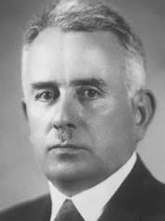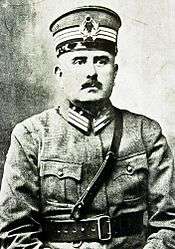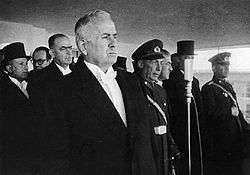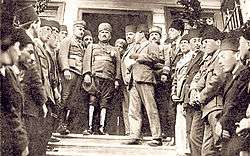Kâzım Karabekir
Musa Kâzım Karabekir (also spelled Kiazim Karabekir in English; 23 July 1882 – 26 January 1948) was a Turkish general and politician. He was the commander of the Eastern Army of the Ottoman Empire at the end of World War I and served as Speaker of the Grand National Assembly of Turkey before his death.
Musa Kâzım Karabekir | |
|---|---|
 | |
| Nickname(s) | Kâzım Zeyrek |
| Born | 23 July 1882 Kocamustafapaşa, Constantinople, Constantinople Vilayet, Ottoman Empire[1][2][3][4] |
| Died | 26 January 1948 (aged 65) Ankara, Turkey |
| Buried | Ankara Hava Şehitliği |
| Allegiance | |
| Years of service | 1902–1924 |
| Rank | General |
| Commands held | 1st Expeditionary Force, 14th Division, 18th Corps, II Corps, I Caucasian Corps, XIV Corps, XV Corps, Eastern Front, 1st Army |
| Battles/wars | Balkan Wars World War I Turkish War of Independence |
| Other work | Member of the TBMM (Edirne) Member of the TBMM (Istanbul) |
| Signature |  |
Early life
Karabekir was born in 1882 as the son of an Ottoman general, Mehmet Emin Pasha, in the Kocamustafapaşa quarter of the Kuleli neighborhood of Constantinople, in the Ottoman Empire. The Karabekir family traced its heritage back to the medieval Karamanid Principality, in central Anatolia.[2]
Karabekir toured several places in the Ottoman Empire while his father served in the army. He returned to Istanbul in 1893 with his mother after his father died in Mecca. They settled in the Zeyrek Quarter. Karabekir was put into Fatih Military Secondary School the next year. After finishing his education there, he attended the Kuleli Military High School from which he graduated in 1899. He continued his education at the Ottoman Military College, which he finished on 6 December 1902 at the top of his class.
Military career
As a junior officer, he was commissioned in January 1906 after two months to the Third Army in the region around Bitola in North Macedonia. There, he was involved in fights with Greek and Bulgarian komitadjis. For his successful service, he was promoted to the rank of senior captain in 1907. In the following years, he served in Constantinople and again in the Second Army in Edirne.
On 15 April 1911, Kâzım applied to change his family name from Zeyrek to Karabekir. Until then, he had been called Kâzım Zeyrek, after the place in which he lived with his mother, a custom in the Ottoman Empire as family names were not used. From then on, he adopted the name Karabekir, the name of his ancestors.
Balkan Wars
During his service in Edirne, Karabekir was promoted to the rank of major on 27 April 1912. He took part in the First Balkan War against Bulgarian forces but was captured during the Battle of Edirne-Kale on 22 April 1913. He remained a prisoner-of-war until the armistice of 21 October 1913.
World War I
Before the outbreak of World War I, Karabekir served in Constantinople and was then sent to some European countries like Austria-Hungary, Germany, France and Switzerland. In July 1914, he returned home, as a world war was likely.
Back in Constantinople, Karabekir was assigned the chief of intelligence at the General Staff. Soon, he was promoted to lieutenant colonel. After a short time on the southeastern front, he was sent to the Dardanelles. As commander of the 14th Division, Karabekir fought in the Battle of Gallipoli in the summer of 1915. In October 1915, he was appointed chief staff officer at the First Army in Istanbul.
He was commissioned to the Iraqi front to join the Sixth Army. For his success at Gallipoli, he was decorated in December 1915 by both the Ottoman and the German Commands and was contemporaneously promoted to colonel. In April 1916, he took over the command of the 18th Corps, which gained a great victory over the British forces led by General Charles Townshend during the Siege of Kut-al Amara in Iraq.
Karabekir was appointed commander of the 2nd Corps on the Caucasian front and fought bitterly against the Russian and Armenian forces for almost ten months. In September 1917, he was promoted to brigadier general by a decree of the Sultan.
Turkish War of Independence

In compliance with the Treaty of Sèvres, which ended World War I, Ottoman Sultan Mehmet Vahdettin gave Karabekir the order to surrender to Entente powers, which he refused to obey. He stayed in the region and, on the eve of the Erzurum Congress, when Mustafa Kemal had just arrived in Erzurum, he secured the city with a cavalry brigade under his command to protect him and the congressmen. He pledged with Mustafa Kemal to join the Turkish national movement and then took the command of the Eastern Front during the Turkish War of Independence by the Kuva-yi Milliye.
In early September 1920, Karabekir commenced the first military operations against the Democratic Republic of Armenia. There were brief small-scale skirmishes in the region of Olti, but as the Turkish offensive elicited virtually no reaction from the Allied Powers, Karabekir opened up the offensive. On 28 September, he sent four divisions from the XV Army Corps across the Armenian border with the objective of capturing the strategic fortress of Sarikamish.[5] Sarikamish was taken the following day, and the rest of the Turkish advance continued unchecked. Throughout October, Armenian resistance progressively collapsed, and the Turkish armies captured Kars on 30 October and occupied Alexandropol, a major centre of the new Armenian Republic, on 6 November.[6] A ceasefire was concluded on 18 November, and negotiations were carried out between Karabekir and a peace delegation, led by Alexander Khatisian, in Alexandropol. Although Karabekir’s terms were extremely harsh, the Armenian delegation had little recourse but to agree to them. Karabekir affixed his signature under the peace agreement, the Treaty of Alexandropol, which was signed on 2/3 December 1920.[7]
He was designated by the new Grand National Assembly in Ankara to sign also the friendship agreement Treaty of Kars with the Soviet Union on 23 October 1921.
Political career

After the defeat of Greek forces in Western Anatolia, the Republic of Turkey was proclaimed. Kâzım Karabekir Pasha moved to Ankara in October 1922 and continued to serve in the parliament as Deputy of Edirne. He was still the acting commander of the Eastern Army when he was elected Deputy of Constantinople on 29 June 1923. Six months later, he was appointed Inspector of the First Army. The received the highest Turkish award by the parliament, the "Order of Independence" for his meritorious and distinguished service in the military and politics during the War of Independence. He retired from military service in October 1924 and then entered politics.[8]
Karabekir had differences of opinion with Mustafa Kemal about the realization of Atatürk's Reforms, one of the most important being the abolition of caliphate. Even though he agreed with Mustafa Kemal on the subject, he did not agree with him on immediate action. For Karabekir, the timing was inappropriate because British forces stood at the border of southeastern Turkey and claimed Kirkuk, now in Iraq. Karabekir did not believe that the caliphate should be abolished before the was solved. Kurds, more radical in their Shafi Sunni beliefs, began to rise against the government because they thought that the government would abolish religion after it ended the caliphate. Struggling with the rebellion, Turkey agreed to leave Kirkuk to Iraq, which was under the British mandate. Such conflicts prompted tensions between Karabekir and Mustafa Kemal.
On 17 November 1924, several politicians around Karabekir and Ali Fuat Cebesoy founded the political movement Progressive Republican Party (Terakkiperver Cumhuriyet Fırkası),[9] which had several prominent current and former military commanders in his members.[10] Afterwards, the party's recent members were blamed for the Sheikh Said rebellion and the assassination attempt made against Mustafa Kemal in İzmir.[11]The party was closed on 5 June 1925 by the government, and Karabekir was imprisoned by the Independence Tribunals with many of his party members but later acquitted and released.[11] Following those developments, all relations were broken between Karabekir and Mustafa Kemal.
Retiring temporarily from politics, Karabekir devoted himself to writing his memoirs of the Turkish War of Independence and Atatürk's Reforms. After Mustafa Kemal died in 1938, Karabekir's close friend İsmet İnönü rehabilitated him.
In 1939, Kâzım Karabekir returned to politics and re-entered parliament as an MP from Istanbul. He was elected speaker of the parliament on 5 August 1946. He died in office at the age of 66 on 26 January 1948 in Ankara after a heart attack. His remains were later relocated to the Turkish State Cemetery in Ankara.
Kâzım Karabekir was survived by his wife İclal and three daughters Hayat, Emel, and Timsal. The four-story mansion in the Erenköy quarter of Kadıköy district in Istanbul, where he lived for almost 15 years, was converted into a museum in 2005.
Bibliography
- Ankara'da Savaş Rüzgarları (Winds of War in Ankara), 448 pp.
- Bir Düello ve Bir Suikast (A Duel and An Assassination), 272 pp. ISBN 975-7369-39-X
- Birinci Cihan Harbi 1–4 (World War I 1–4), 4 books 1320 pp. ISBN 975-7369-21-7
- Birinci Cihan Harbine Neden Girdik? (Why Did We Enter the World War I?), 199 pp. 1st book ISBN 975-7369-21-7
- Birinci Cihan Harbine Nasıl Girdik? (How Did We Enter the World War I?), 464 pp. 2nd book ISBN 975-7369-22-5
- Birinci Cihan Harbini Nasıl İdare Ettik? (How Did We Manage the World War I?), 272 pp. 3rd book ISBN 975-7369-23-3
- Birinci Cihan Harbini Nasıl İdare Ettik? (How Did We Manage the World War I?), 384 pp. 4th book ISBN 975-7369-24-1
- Cumhuriyet Tarihi Set 1 (History of the Republic Set 1), 13 books
- Cumhuriyet Tarihi Set 2 (History of the Republic Set 2), 12 books
- İstiklal Harbimiz 1–5 (Our War of Independence 1–5), 5 books
- Paşaların Kavgası (Struggle of the Pashas)
- Paşaların Hesaplaşması (Revenge of the Pashas)
- İzmir Suikastı (Assassination in İzmir)
- Çocuklara Öğütler (Advice to Children)
- Hayatım (My Life)
- İttihat ve Terakki Cemiyeti 1896–1909 (Committee of Union and Progress 1896–1909)
- Ermeni Dosyası (Armenian Dossier)
- İngiltere, İtalya ve Habeş Harbi (British, Italian and Ethiopian War)
- Kürt Meselesi (Kurdish Problem)
- Çocuk, Davamız 1–2 (The Child, Our Problem 1–2), 2 books
- İstiklal Harbimizin Esasları (Principals of Our War of Independence)
- Yunan Süngüsü (Greek Bayonet)
- Sanayi Projelerimiz (Our Industrial Projects)
- İktisat Esaslarımız (Our Principals of Economy)
- Tarihte Almanlar ve Alman Ordusu (Germans in the History and German Army)
- Türkiye'de ve Türk Ordusunda Almanlar (Germans in Turkey and in the Turkish Army)
- Tarih Boyunca Türk-Alman İlişkileri (Turkish-German Relations Throughout the History)
- İstiklal Harbimizde İttihad Terakki ve Enver Paşa 1–2 (Union Progress and Enver Pasha in Our War of Independence)
- İstiklal Harbimizin Esasları Neden Yazıldı? (Why Was the Principals of Our War of Independence Written?)
- Millî Mücadele'de Bursa (Bursa During the War of Independence)
- İtalya ve Habeş (Italy and Ethiopia)
- Ermeni Mezalimi (Armenian Outrage)
- Sırp-Bulgar Seferi (Serbian-Bulgarian Campaign)
- Osmanlı Ordusunun Taarruz Fikri (Attack Concept of the Ottoman Army)
- Erkan-i Harbiye Vezaifinden İstihbarat (Intelligence from the Service at General Staff)
- Sarıkamış, Kars ve Ötesi (Sarıkamış, Kars and Beyond)
- Erzincan ve Erzurum'un Kurtuluşu (Liberation of Erzincan and Erzurum)
- Bulgaristan Esareti - Hatıralar, Notlar (Captivity in Bulgaria - Memories, Notes)
- Nutuk ve Karabekir'den Cevaplar (The Address and Replies From Karabekir)
References
| Wikimedia Commons has media related to Kâzım Karabekir. |
- Elaine Diana Smith, Turkey: origins of the Kemalist movement and the government of the Grand National Assembly, 1919–1923, American University, 26 January 1959, p. 171.
- Stanford Jay Shaw, The Ottoman Empire in World War I: Prelude to war, Turkish Historical Society, 2006, ISBN 978-975-16-1881-8, p. 119.
- The Encyclopædia Britannica, Vol.7, Edited by Hugh Chisholm, (1911), 3; Constantinople, the capital of the Turkish Empire...
- Britannica, Istanbul:When the Republic of Turkey was founded in 1923, the capital was moved to Ankara, and Constantinople was officially renamed Istanbul in 1930.
- Hovannisian, Richard G. (1996). The Republic of Armenia, Vol. IV: Between Crescent and Sickle, Partition and Sovietization. Berkeley: University of California Press. pp. 184–195. ISBN 0-520-08804-2.
- Hovannisian. Republic of Armenia, Vol. IV, pp. 237–282.
- Hovannisian. Republic of Armenia, Vol. IV, pp. 394–396.
- Heper, Metin; Landau, Jacob M. (1991). Political Parties and Democracy in Turkey. I.B. Tauris. p. 120. ISBN 1850433003.CS1 maint: date and year (link)
- Göksu, Saime; Timms, Edward (1999). Romantic Communist: The Life and Work of Nazım Hikmet. Hurst. p. 54. ISBN 978-1-85065-371-4.
- Heper, Metin; Landau, Jacob M. (1991), p.72–73
- Karpat, Kemal H. (2015-12-08). Turkey's Politics: The Transition to a Multi-Party System. Princeton University Press. pp. 47–48. ISBN 978-1-4008-7942-7.
| Military offices | ||
|---|---|---|
| Preceded by Nurettin Pasha |
Inspector of the First Army 21 October 1923 – 26 October 1924 |
Succeeded by Ali Said Pasha (Akbaytogan) |
| Political offices | ||
| Preceded by Mustafa Abdulhalik Renda |
Speaker of the Grand National Assembly of Turkey 5 August 1946 – 26 January 1948 |
Succeeded by Ali Fuat Cebesoy |

.svg.png)